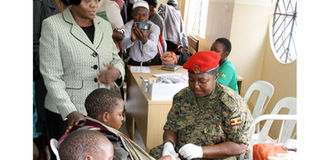Ministry warns on ‘cheap’ water

Primary Healthcare minister Sarah Opendi (left) comforts a girl on treatment at Kisenyi Health Centre IV in Kampala on Thursday. Photo by Abubakar Lubowa
KAMPALA. The State Minister Primary Healthcare has asked people who work in the taxi parks to report vendors selling rebottled and unboiled water, to the police in a bid to fight the typhoid outbbreak.
While addressing taxi drivers, vendors and business men and women in the Old Taxi Park on Thursday, Ms Sarah Opendi asked them to desist from buying cheap water because it is contaminated with faecal matter, exposing them to diseases, including typhoid.
“Typhoid is caused by consuming food or water which has faeces which means it is an issue of sanitation. There are people who sell water at a cheap price; you find that the supermarket sells genuine bottled water at Shs600 but another is selling it at Shs500 and you decide to buy it yet it is contaminated,” Ms Opendi said.
“We cannot differentiate between genuine and fake water, especially the rebottled ones because it comes packaged the same way. But you have to be the ones who should pin point the culprits, be spies and tell us who they are so that we can arrest them.”
A 2015 survey by the Ministry of Environment found that 63 per cent of re-bottled water contaminated with faecal matter and was named as one of the major causes of salmonella, the germ that causes typhoid. In addition, 90 per cent of the protected springs in Kampala were also contaminated.
According to Deogratius Semakula, a taxi driver in the park, it is hard to pin point who sells the contaminated water because people buy it at will depending on their income.
“There are vendors who sell water at Shs400, others at Shs1,200 while others at Shs1,000 (a jerrican), you can only buy whatever you want depending on the money in your pocket, nothing more. We do not know the difference between contaminated and genuine water but our pockets determine what we consume,” he explained.
Infection rate dropping
Meanwhile, the number of patients being treated at Kisenyi Health Centre IV, the designated treatment centre for typhoid, is decreasing.
Mr Badru Byaruhanga, the laboratory technician at the health facility said even though the number of people going to the facility claiming to have typhoid is high, the number of people actually being treated for the disease has reduced considerably.
“On average, we get 170 patients per day but of these, at least 80 are positive,” he said.
Cost of treating
Shs5b has been spent in combating the typhoid outbreak that killed at least two people in the country, Ms Opendi said. She however added that the cost will increase because it has not yet been fully contained.




